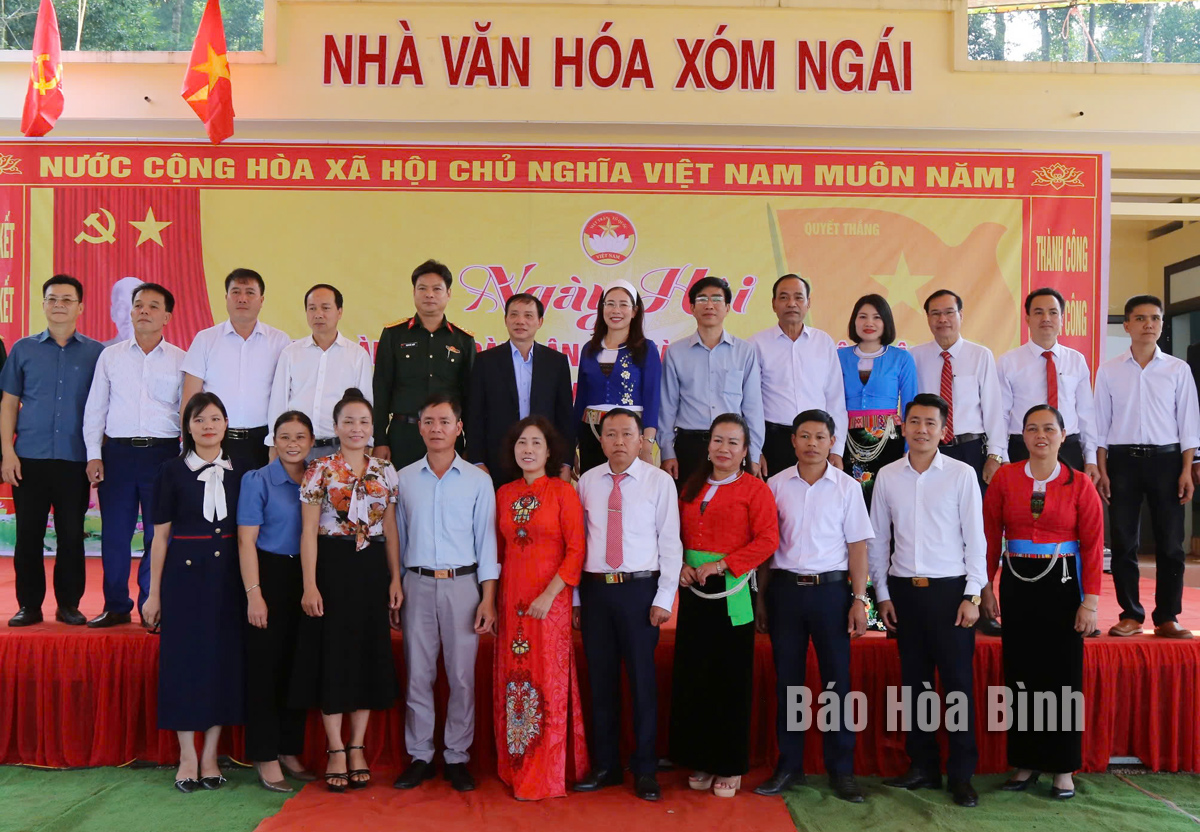
In recent years, under the leadership of the provincial Party Committee and People’s Council, and through the concerted efforts of local Party organisations, authorities, and ethnic communities, Hoa Binh province has achieved significant progress in implementing ethnic affairs and policies. These efforts have brought a new face-lift to ethnic-minority-inhabited and mountainous areas, according to Ha Van Di, Head of the Ethnic Affairs Board of Hoa Binh province.
Bui Van Khanh, Deputy Secretary of the Hoa Binh provincial Party Committee and Chairman of the provincial People's Committee, and other delegates attend the great national unity and military-civilian culture festival in Ngai hamlet, Thach Yen commune, Cao Phong district
The economic situation and livelihoods of ethnic communities in the province remain stable, with social welfare ensured and public safety maintained. Ethnic groups have fostered a strong sense of solidarity, mobilising internal resources to actively work, study, and boost economic development. Improvements in the material and spiritual lives have contributed to narrowing the development gap between ethnic and mountainous areas and other regions.
Notably, the poverty rate in ethnic-minority and mountainous areas has decreased by 3.36% on average annually, with extremely disadvantaged communes achieving an annual reduction of 6.4%. Currently, 62% of communes or 80 out of a total of 129 have met new-style rural development standards, including 14 extremely disadvantaged and seven disadvantaged communes. An additional six extremely disadvantaged communes are expected to meet these standards by the year-end. Rural infrastructure continues to improve, social welfare policies are effectively implemented, and national defence and security are firmly upheld.
These achievements stem from the commitment and responsibility of Party committees and authorities, who prioritise regular dissemination of information to enhance the effectiveness of ethnic policy implementation. Authorities actively monitor socio-economic conditions and the aspirations of local communities, addressing challenges promptly to prevent "hot spots" at the grassroots level. Collaborative efforts among various sectors have been strengthened, with a focus on the implementation, oversight, and evaluation of ethnic programmes, projects, and policies, particularly national target programmes.
Efforts also prioritise developing a strong contingent of ethnic minority leaders and enhancing the roles of reputable individuals, village elders, and community leaders within ethnic groups.
Looking ahead, ethnic minority communities in Hoa Binh are encouraged to continue promoting patriotic movements and innovative labour, in combination with Directive No. 05-CT/TW, issued by the Politburo on May 15, 2016, to advance the study and following of President Ho Chi Minh’s thought, morality, and style. These initiatives contributed to the broader national goal of building a prosperous, strong, fair, democratic, and civilised society.
For the 2024-2029 period, Hoa Binh aims to achieve several key targets, including lifting the per capita income of ethnic minorities in rural areas to half the national average and reducing the poverty rate among ethnic minorities by 2.5-3% annually, and by 4-4.5% in extremely disadvantaged communes.
Over 90% of ethnic minority farming households will engage in commercial agriculture and forestry while ensuring over 90% of communes and villages in ethnic minority and mountainous areas have basic infrastructure to support socio-economic development and improve living standards.
The ethnic communities of Hoa Binh remain united and determined to collaborate with the province's political system to realise these ambitious goals, creating a brighter future for all.
The emulation movement "Hoa Binh joining hands to build new-style rural areas” has been widely spreading, becoming a driving force that motivates the localities to renew rural landscapes and improve the material and spiritual lives of the residents. In this movement, the people play a central role-both as the main implementers and direct beneficiaries of its outcomes.
In response to the global digital revolution, Hoa Binh Newspaper is transforming itself into a modern and multi-platform media hub, blending cutting-edge technology with a restructured newsroom and a new generation of tech-savvy journalists.
Hoa Binh province’s Association of the Elderly recently held a conference to review the project on expanding the inter-generation self-help club model until 2025.
In a move to implement Resolution No. 57-NQ/TW, issued on December 22, 2024 by the Politburo, which targets breakthroughs in science-technology development, innovation, and digital transformation, the Hoa Binh provincial Department of Health has issued a plan to roll out the "Digital Literacy for All” campaign within the local health sector.
An Nghia Commune (Lạc Sơn District) is one of the communes that achieved the tha standard of the national new rural area in 2018. Entering a new development phase, the commune is now trying to meet the criteria for the advanced new rural development. With the strong political will and the public consensus, the commune is gradually overcoming the challenges to reach this goal, aiming for the sustainable development.



